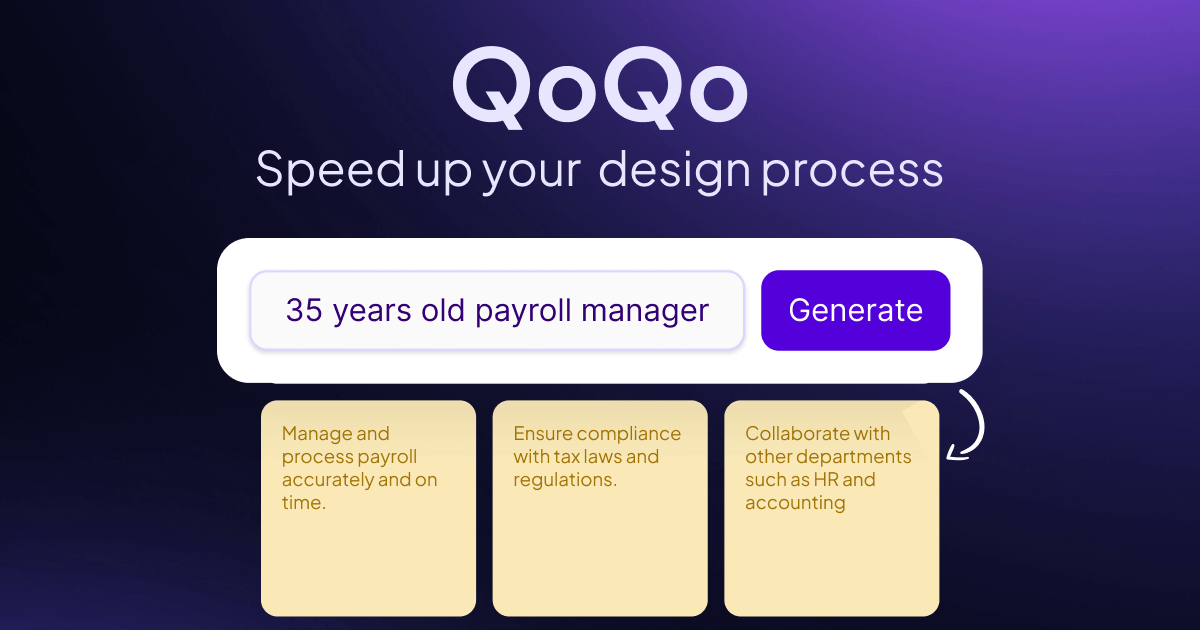QoQo AI
QoQo.ai: Revolutionizing UX Design with AI-Powered Insights

QoQo.ai: Revolutionizing UX Design with AI-Powered Insights


QoQo.ai: AI-Powered UX Companion for User Persona Creation, Journey Mapping, and More
QoQo.ai is an advanced AI-driven assistant designed to accelerate and enrich the early stages of user experience (UX) design. By leveraging cutting-edge natural language processing and machine learning models, QoQo.ai empowers UX professionals to generate comprehensive user personas, craft data-informed journey maps, and construct coherent information architectures in a fraction of the time it would take using traditional methods. Rather than starting with blank templates or relying on guesswork, designers can input basic demographic and project parameters—such as target age range, occupation, geographic location, and product context—and QoQo.ai instantly produces in-depth profiles, behavior patterns, and research prompts. This not only helps teams gain a clear understanding of end users from the outset but also ensures that design decisions are grounded in realistic, research-driven insights.
QoQo.ai serves as a comprehensive AI companion throughout the UX discovery and research phases. It helps teams:
QoQo.ai employs a multi-step process to transform minimal inputs into actionable UX deliverables:
Individual UX Designers & Freelancers: Freelancers can leverage QoQo.ai to produce high-quality personas and journey maps quickly, enabling them to take on more client projects without compromising on research depth. By automating time-intensive tasks, individual designers can focus on high-level strategy and creative exploration.
Design Agencies & Startups: Small to medium-sized agencies and early-stage startups often lack extensive research budgets. QoQo.ai provides a cost-effective solution to perform initial UX research, generate actionable insights, and establish user-centric design frameworks. Teams can standardize processes across multiple projects, ensuring consistent deliverables even with limited headcount.
Product Managers & UX Researchers: Product managers and researchers benefit from QoQo.ai by quickly validating assumptions about target audiences and creating research artifacts. The tool’s ability to generate structured questionnaires and interview scripts accelerates recruitment and study phases. Researchers can extract key insights from raw data using the document chat feature, streamlining analysis workflows.
Content Strategists & Marketing Teams: Content teams can use the persona outputs to align messaging, tone, and channel strategies with specific user archetypes. Marketing managers can also reference journey maps to identify optimal touchpoints for campaigns, improving ROI on ad spend.
Product Development & Engineering Teams: By understanding user pain points and goals early in the development cycle, engineering teams can prioritize features that align with real user needs. QoQo.ai’s information architecture recommendations help structure MVPs and future iterations more effectively.
QoQo.ai stands out as a robust AI-powered platform that transforms the way UX professionals approach early-stage design. Its extensive suite of features—from persona creation to seamless Figma integration—enables teams to ground every decision in research-based insights. By reducing manual workload and offering affordable pricing, QoQo.ai democratizes advanced UX processes for individuals, agencies, and large product teams. Whether you are a solo designer needing quick persona drafts or a cross-functional team aiming to standardize UX best practices, QoQo.ai delivers scalable, reliable outputs that elevate user-centric design and drive product success.